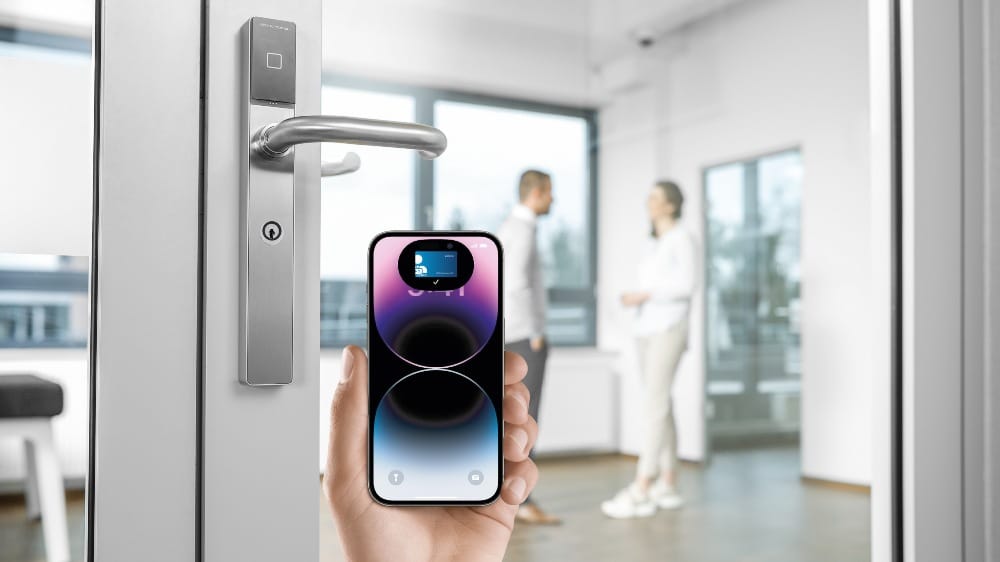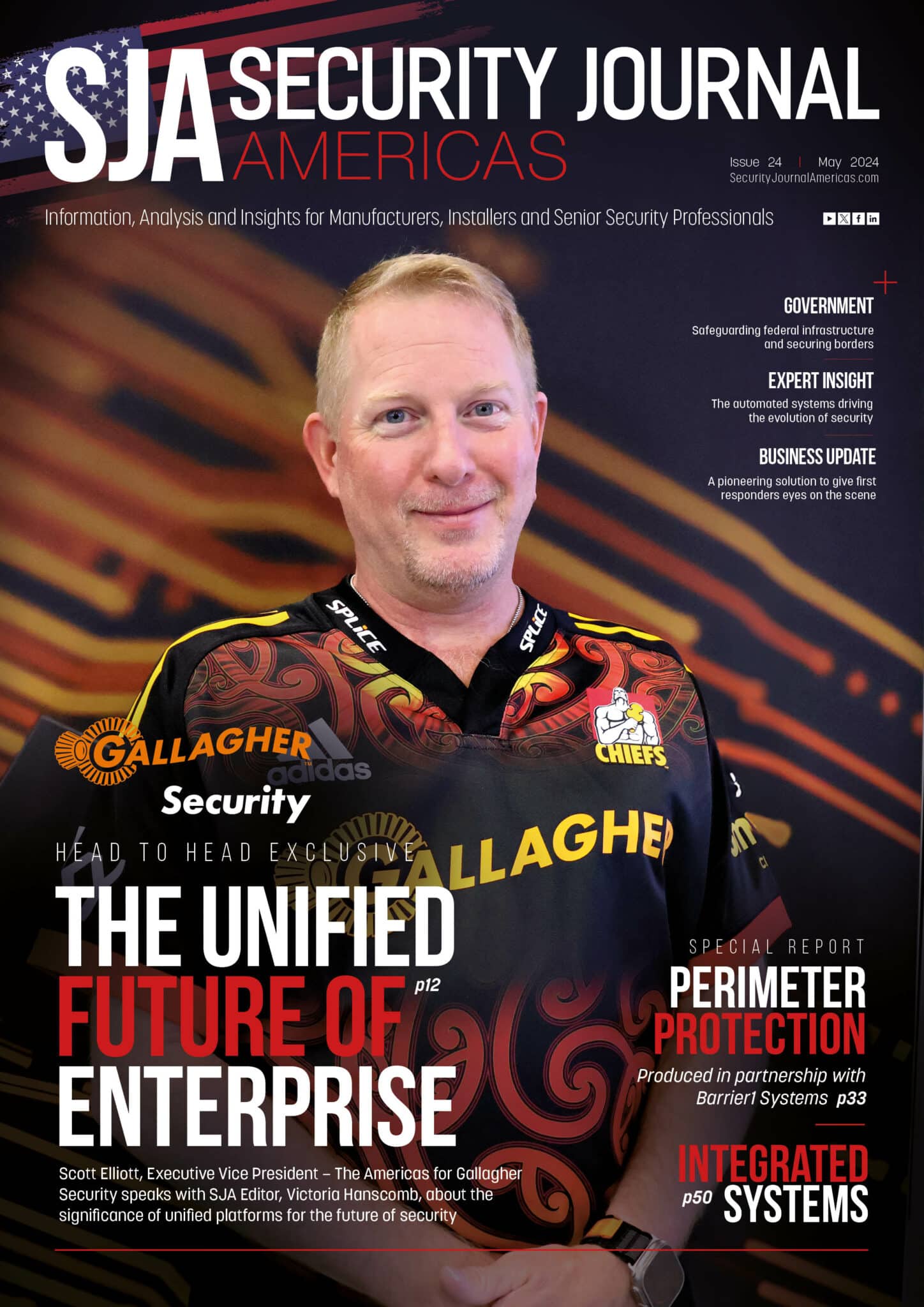Mobile credentials and control


Victoria Rees
Share this content
John Harvey, Head of Business Unit Access Management globally at LEGIC tells SJA about mobile credentials and the company’s growth in the North American market.
Article Chapters
ToggleAccessing control and mobile credentials
“I head up the business unit Access Control at LEGIC for all applications that are contactless, radio-frequency identification (RFID) or mobile-based and used by employees at corporate organizations,” said Harvey.
“My business unit makes sure that an employee who works at a company has a card or mobile credential to access the building, but which can also work for other applications such as time and attendance, secure printing, virtual PC login as well as to purchase a coffee at a vending machine or to access parking.”
He explained that it is his team’s responsibility to manage all the partners that work with LEGIC within this space.
Harvey went on to discuss what differentiates LEGIC in the market, highlighting that the company is unique in three different aspects: security, multiple application support and open standards.
“Since LEGIC was set up 30 years ago, it has always been considered a high security company that delivers highly secure solutions,” Harvey added.
He explained that this includes the company’s transponder card technology, as well as the chips and secure modules that go into its partners access control readers and other RFID, near field communication (NFC) and Bluetooth (BLE) capable products.
All of the company’s solutions pass regular security audits and Harvey explained that high secure cryptographic key management is a top priority for LEGIC, enabling end customers to own and manage the core elements of their security.
With built-in key management, the LEGIC Security Platform empowers its users along the critical processes of setting-up trusted applications, commissioning the necessary infrastructure in the field and maintaining it for years of use.
Harvey emphasized that the corporate employee badge is also evolving, combining multiple functionalities onto one card or on one mobile credential, to make it easy for end customers at large corporations to easily deploy and manage new applications.
He also explained that end users can choose from a whole range of different access reader and lock vendors, as LEGIC’s technology is flexible and open, to provide end users with freedom of choice.
“We’re very much seen as a flexible multi-application solution by end customers,” said Harvey.
“We help our partners to support a whole range of different applications for corporate employees.
“We try to make it easy for our partners to build their contactless product and let them focus on their specific application while we take care of the security and complex contactless communications, be this via RFID, NFC or BLE.”
Additionally, Harvey said that LEGIC secure reader ICs support a whole range of different contactless smartcard standards.
The solutions from LEGIC do not just work with its own transponder cards, but also with all other relevant smartcards, to make it easy for the company’s partners to build a successful product and support multiple options.
Heading to Las Vegas
At ISC West 2024, Harvey said that LEGIC will be spotlighting two primary things. First is the company’s Credential Manager service for the support of Apple Wallet and Google Wallet.
“We have a trusted secure cloud service available worldwide for our partners to use in order to deliver their employee badge into mobile wallets.
“That’s also a definite trend over the last year or two – to have not just employee badges but other credentials such as hotel room keys or apartment keys stored in Apple Wallet or Google Wallet,” said Harvey.
An additional product that the company will be promoting at the show will be its LEGIC Mobile Credential Service, designed for end customers who do not have their own ability to create a mobile credential.
This service will therefore allow them to deliver a LEGIC-branded credential into a LEGIC-branded mobile app on Android or iOS.
The advantage of this, he said, is that the LEGIC standard mobile credential will be compatible with and read by many hardware vendors from LEGIC’s partner network.
“This follows the theme of having an open choice of the access reader, lock and other reader you wish to install,” he said.
Growing in North America
Next, Harvey discussed how LEGIC plans to strengthen its presence within the North American market.
“We’re building a growing team over the next months and we’ll be adding to our feet on the ground in North America – multiplying to three or four times what we had before.”
Harvey added that there is a focus on sales and business development within North America but also on customer success.
This is because the company’s services, particularly Apple Wallet and Google Wallet, require robust customer support.
“We’re building that team on the ground,” he said.
“We’re also working with LEGIC partners who build their LEGIC standardized products and offer them to the market in North America, whether that’s readers or locks, etc.
“Working closely with those application providers or vendors means we are going to build a marketplace online so that anybody who is looking for a solution can then see the LEGIC offerings such as our card or mobile credentials as well as the full range of different suppliers that are compatible with the LEGIC standard.”
Harvey highlighted that other competitors in the market build their service and focus on their hardware, whereas LEGIC is focused on offering a range of different partner products that are standardized and can work with a LEGIC credential.
The future of access control
Harvey said that using Wallets for credentials is a growing trend that shows no sign of stopping.
“It’s growing quickly,” he said. “Another more mid- to long-term trend in the future would be seamless entry.”
Harvey explained that this is when a phone or other credential does not have to be held to a reader to grant access to an individual; rather, the credential can be kept in a pocket or bag and when moved close to a door or gate, it will be recognized.
“Also, the intent of the user with such a credential will be understood – for example, which direction the user is moving in and the user’s angle of approach,” Harvey explained.
“It also detects distance so that it knows whoever is nearest the door and the lock.”
Harvey said that there is an extra layer of security with this seamless entry concept, to mitigate against it being hacked or compromised and that the new Aliro standards to be released by CSA at the beginning of next year will be supported by LEGIC and its partners in the future.
Lastly, Harvey highlighted that there is also a move toward more advanced card technology with intelligent CPU or processor-based cards, a technology also supported by smartphones.
He explained that with LEGIC’s new CPU card Java applet-based neon technology employees will be able to have multiple applications on their card.
For example, they may be able to use the card for access control but then also utilize it for fast identification purposes, to log into their computer (FIDO).
About LEGIC Identsystems
For over 30 years, Swiss-based LEGIC Identsystems has enabled companies from around the world to deploy solutions with demanding security requirements.
Based on key management, trusted services and secure, contactless semiconductors, the LEGIC Security Platform provides end-to-end security for smartphone and smartcard-based access, mobility, shared resource and industrial IoT applications.
For more information, visit: www.legic.com.
This article was originally published in the April edition of Security Journal Americas. To read your FREE digital edition, click here.


